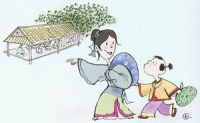Difference between revisions of "The mother of Mencius"
imported>Ciic (Created page with 'thumb|200px|left|The mother of Mencius '''Chang-shih''', '''the mother of Mencius''' is regarded as one of the great mothers in China’s hist...') |
imported>Ciic |
||
| Line 3: | Line 3: | ||
'''Chang-shih''', '''the mother of Mencius''' is regarded as one of the great mothers in [[China]]’s history because of her influence on her son, who became one of China’s most distinguished philosophers and Confucian scholars | '''Chang-shih''', '''the mother of Mencius''' is regarded as one of the great mothers in [[China]]’s history because of her influence on her son, who became one of China’s most distinguished philosophers and Confucian scholars | ||
| − | Born in the state of Zhou (now Zhoucheng in Shandong_Province) during the Warring States Period (475BC-221BC), Mencius lost his father when he was very young. He received all his early education from his mother. Chang-shih was very considerate and paid close attention to her son’s academic and moral education. | + | Born in the state of Zhou (now Zhoucheng in Shandong_Province) during [[the Warring States Period]] (475BC-221BC), Mencius lost his father when he was very young. He received all his early education from his mother. Chang-shih was very considerate and paid close attention to her son’s academic and moral education. |
Legend has it that Chang-shih moved home three times so that her son could find the right atmosphere for studying. | Legend has it that Chang-shih moved home three times so that her son could find the right atmosphere for studying. | ||
Revision as of 07:43, 6 May 2011
Chang-shih, the mother of Mencius is regarded as one of the great mothers in China’s history because of her influence on her son, who became one of China’s most distinguished philosophers and Confucian scholars
Born in the state of Zhou (now Zhoucheng in Shandong_Province) during the Warring States Period (475BC-221BC), Mencius lost his father when he was very young. He received all his early education from his mother. Chang-shih was very considerate and paid close attention to her son’s academic and moral education. Legend has it that Chang-shih moved home three times so that her son could find the right atmosphere for studying.
Their first house was near a cemetery and the young Mencius, distracted by the noise of the funeral rites, began mimicking the chanting of the burial services. Chang-shih decided to move house.
Their next home was in a bustling neighborhood where Mencius began to imitate the cries of the street traders and hawkers. Disapproving of her son’s new pastime, Chang-shih moved house again.
This time they settled near a school where, influenced by the students’ modest manners and learning habits, Mencius started to show an interest in academic study. Pleased with her son’s new attitude, Chang-shih decided to stay put.
The tale is often told in China, and Chang-shih is regarded as a very wise mother. Recently a group of citizens began campaigning for the government to officially recognize Mother’s Day in memory of Mencius’ Mother.
